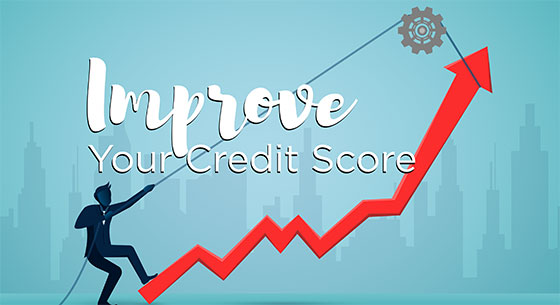If your credit score is lower than you’d like, there may be several things you can do to bring your score up. Depending on what’s holding your score down, you could add as many as 100 points to your score in just a few months. Here’s some steps that might just do the trick:
1) Become an Authorized User— I’ve actually done this for my son. He wanted to buy a house and his credit score was a little low. I added him on as an authorized user to one of my credit card accounts (I had that account for 26 years with perfect payment history and zero balance) and within 30 days his score boosted tremendously and he was approved for his mortgage loan and bought his first house. Let me preface, I didn’t give him the credit card and he promised not to try and use the account. I would definitely keep this to family members only and those that can be trusted.
2) Keep all Credit Card Balances below 30% of Available Credit— This is super important! If you keep high balances it will definitely reduce your credit score so be strategic. If you have multiple accounts, spread out the balances so that they are all less than 30%. Better yet, pay them off in full every month.
3) Credit Line Increases—If you can’t get credit card balances to below 30%, consider asking for a credit line increase. Be very careful here. Some credit card companies will do a “Hard Inquiry” or “Hard Credit Check” when you request a credit line increase which will reduce your score by 5-10 points. If the credit card company confirms it’s a “Soft Inquiry or Soft Credit Check”, it won’t reduce your credit score. Good news is that if you’re successful in getting your balances below 30% on all of your credit cards, you’ll see a bit of a bump up in your credit score and that increase hits your credit score almost immediately (that’s 30-60 days in the credit world). Keep in mind, if you have 5 credit cards and only manage to get one to go down to 30%, you’re not going to see an improvement in your credit score.
4) Pay Bills on Time— This one is more of a way to prevent your score from going down by a 100 points. If you have excellent credit (750+) and have never been late on a payment, one late payment over 30 days could reduce your score by 90 to 110 points. If you miss a payment by 30 days or more, call the creditor immediately. Pay up as soon as you can and ask if the creditor will consider no longer reporting the missed payment to the credit bureaus. Even if the creditor insist on reporting the late payment, getting it current will reduce further reductions to your credit score. Additional bad news, late payments usually stays on your credit report for 7.5 years. Ouch!
5) Deal with Collection Accounts—The best way to identify if you have an account in collections is to request your credit report. Federal law allows you a one time per year complimentary pull on your credit report with all three bureaus, Transunion, Experian and Equifax. Use this link to www.AnnualCreditReport.com to get all three reports for free. You need to review the report from all three bureaus because they will probably be different. Check each report carefully as there could be data entry errors and other people’s account on your credit report. This will take some time as each report could be over 200 pages. If you have errors on your report or collection accounts, contact the original creditor and see if you can resolve the account with them directly. The original creditor recovers a fraction of the amount owed from the collections agency. If you pay in full with a little extra for interest/processing, the original creditor reduces their losses. You’ll need to confirm that by paying the creditor directly, your collections account will be settled on your credit report. If not, you may need to go to the collections agency to negotiate the best resolution possible.
6) Secured Credit Cards—If you’re looking for a way to rebuild your credit or start building your credit score, a secured credit card is a good option. These cards are backed by a cash deposit you pay up front and the deposit amount is usually the same as your credit limit. You can use it like a normal credit card and your on-time payments help build your credit history. Look for a secured credit card that reports your credit activity to all three major credit bureaus. The key is to pay in full each month on time and that will start to build your credit history and score.
7) Complete and Balance your Credit Portfolio – This is more of a fine tuning and to attain that top tier of credit ratings, you’ll need to have all the major element in your credit portfolio. Most loan officers say that if your credit score is 740 or higher, you’re at the top tier and having a higher credit score won’t make much of a difference.
Keeping the big picture in mind, when “Preparing to Buy a Home”, you’ll need:
- A good to excellent credit score
- Low debt to income ratio
- Money for the down payment and closing costs
Call, text or email us for a complimentary consultation!


